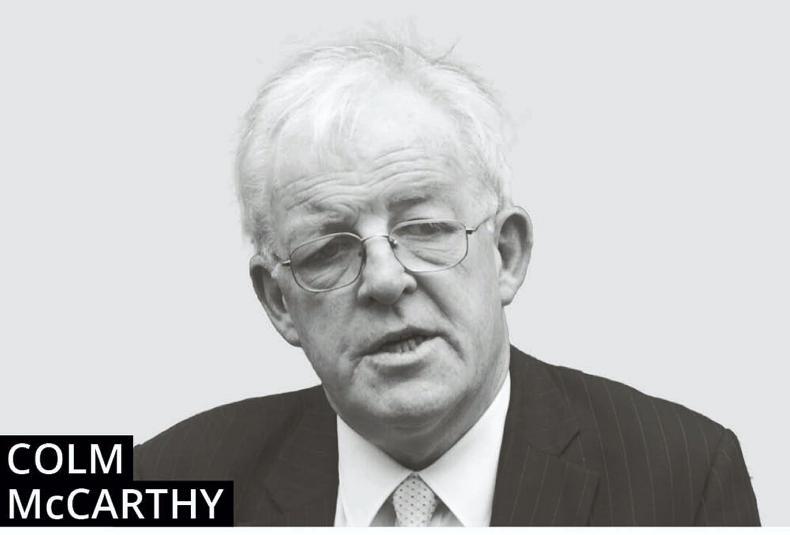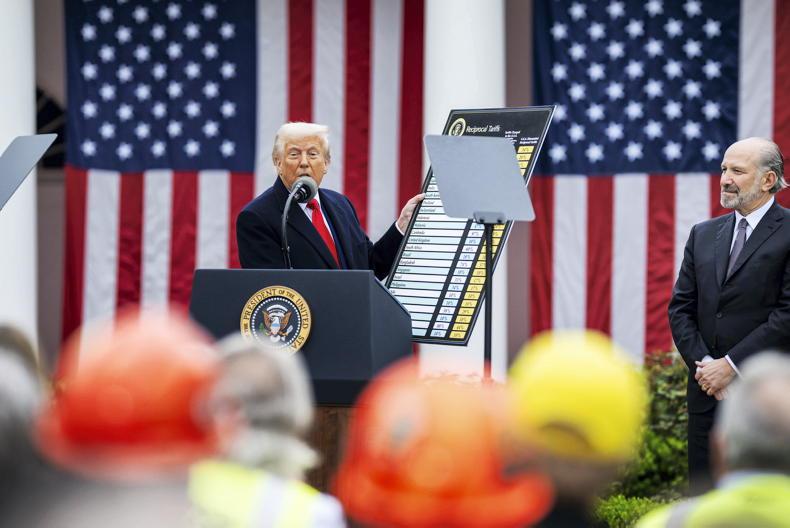Continental EU countries have been supportive of the Irish Government’s position in the Brexit talks, specifically regarding the backstop and the avoidance of a hard border in Northern Ireland. This has been interpreted as an example of EU solidarity with smaller member states, a shorthand narrative which cannot constitute a full explanation.
Solidarity with smaller members was not much in evidence during the eurozone crisis, as Irish taxpayers will recall. When the European Central Bank (ECB) extorted billions in payments to unguaranteed bondholders in bust banks, not a finger was raised in Paris or Berlin. Citizens of Cyprus and Greece will have similar recollections.
There are several factors, in addition to love of small member states, which have contributed to the solidarity of the EU-27 on this issue. The EU’s economic frontiers with a third-country UK will be easily controlled, courtesy of the English Channel and the North Sea, with one exception – the land border in Ireland.
Any special arrangements to keep it open create a potential hazard to the internal market: it is the very essence of the European Union that non-members are outside the internal market and that means border controls somewhere. The result has been the backstop in the withdrawal agreement, a reassurance to the EU as well as to Ireland.
In this decade of centenaries, it is timely to recall the outcome of the Paris peace conference, whose most critical sessions occupied the first half of 1919. The losers of the Great War included the Russian, Ottoman and Hapsburg empires, and the aftermath saw their dissolution. The resulting Versailles treaty re-drew the frontiers of Europe with the creation of new states, and new frontiers, across the continent.
There were continuing conflicts in eastern Europe as the conference was in session and huge movements of displaced populations followed. The new frontiers left large minority populations marooned on the “wrong” side and the subsequent tensions contributed to the eruption of an even greater disaster 20 years later.
The response to World War II absorbed the lessons from the failure of the efforts in Paris that followed the first. Drawing frontier lines on maps will never deliver the perfect outcome, even with forced or voluntary population transfers. One of the border revisions in Paris was the return to France of the lost provinces of Alsace and Lorraine.
The city of Strasbourg, the capital of Alsace, is the awkward seat of the itinerant European Parliament for a reason: its presence there is a symbol that the frontier no longer matters. If frontiers can never be drawn in a manner which will keep everyone happy, the European response since the 1950s has been to make frontiers invisible. Get rid of tariffs and rules about work visas, even get rid of passports. See – the frontier is gone, it has no effect, forget about it.
The downgrading and sublimation of frontiers in Europe has been more than a project of economic policy – it has been a pact of forgetting.
Seen in this light, the 1998 Good Friday Agreement (GFA) was a very European peace deal. The two states concerned agreed that the frontier could stay where it was but that it would become invisible for all practical purposes. There are Danish-speaking citizens on the German side of the border in Schleswig-Holstein. German is spoken in Strasbourg and in parts of northern Italy, Hungarian in eastern Slovakia. People are, however, free to feel as Danish, German or Hungarian as they wish without constant frontier hassle.
External frontiers
On the external frontiers of the EU, things are not so simple and the apparent willingness of the UK government to call the 1998 settlement into question, on what will become an external EU border, rang all the wrong bells in Brussels.
Donald Tusk, the European Council president, is from Poland, a country with a modern history of shifting frontiers, and Jean-Claude Juncker, who heads the European Commission, is from Luxembourg, first on the invasion agenda in several of the great European conflicts. Michel Barnier, the chief negotiator for the EU-27, comes from the borderland of Savoie in southeastern France, where the region around Nice (Nizza) was Italian until annexed by France towards the end of the 19th century. France and Italy fought on opposing sides in World War II.
These gentlemen and their contemporaries in European politics are allergic to hard borders. Their insistence on respect for the GFA is unsurprising and perfectly in tune with the pact of forgetting.
The EU as an institution was not central to the negotiation of the GFA, which was the achievement of a generation of British and Irish politicians and diplomats, with support from the Clinton administration in the US. But the European Union was bound to feel proprietorial about the concept of keeping borders invisible.
Read more
No upside for Ireland regardless of Brexit outcome – ESRI
Farmer Writes: the Brexit circus
Continental EU countries have been supportive of the Irish Government’s position in the Brexit talks, specifically regarding the backstop and the avoidance of a hard border in Northern Ireland. This has been interpreted as an example of EU solidarity with smaller member states, a shorthand narrative which cannot constitute a full explanation.
Solidarity with smaller members was not much in evidence during the eurozone crisis, as Irish taxpayers will recall. When the European Central Bank (ECB) extorted billions in payments to unguaranteed bondholders in bust banks, not a finger was raised in Paris or Berlin. Citizens of Cyprus and Greece will have similar recollections.
There are several factors, in addition to love of small member states, which have contributed to the solidarity of the EU-27 on this issue. The EU’s economic frontiers with a third-country UK will be easily controlled, courtesy of the English Channel and the North Sea, with one exception – the land border in Ireland.
Any special arrangements to keep it open create a potential hazard to the internal market: it is the very essence of the European Union that non-members are outside the internal market and that means border controls somewhere. The result has been the backstop in the withdrawal agreement, a reassurance to the EU as well as to Ireland.
In this decade of centenaries, it is timely to recall the outcome of the Paris peace conference, whose most critical sessions occupied the first half of 1919. The losers of the Great War included the Russian, Ottoman and Hapsburg empires, and the aftermath saw their dissolution. The resulting Versailles treaty re-drew the frontiers of Europe with the creation of new states, and new frontiers, across the continent.
There were continuing conflicts in eastern Europe as the conference was in session and huge movements of displaced populations followed. The new frontiers left large minority populations marooned on the “wrong” side and the subsequent tensions contributed to the eruption of an even greater disaster 20 years later.
The response to World War II absorbed the lessons from the failure of the efforts in Paris that followed the first. Drawing frontier lines on maps will never deliver the perfect outcome, even with forced or voluntary population transfers. One of the border revisions in Paris was the return to France of the lost provinces of Alsace and Lorraine.
The city of Strasbourg, the capital of Alsace, is the awkward seat of the itinerant European Parliament for a reason: its presence there is a symbol that the frontier no longer matters. If frontiers can never be drawn in a manner which will keep everyone happy, the European response since the 1950s has been to make frontiers invisible. Get rid of tariffs and rules about work visas, even get rid of passports. See – the frontier is gone, it has no effect, forget about it.
The downgrading and sublimation of frontiers in Europe has been more than a project of economic policy – it has been a pact of forgetting.
Seen in this light, the 1998 Good Friday Agreement (GFA) was a very European peace deal. The two states concerned agreed that the frontier could stay where it was but that it would become invisible for all practical purposes. There are Danish-speaking citizens on the German side of the border in Schleswig-Holstein. German is spoken in Strasbourg and in parts of northern Italy, Hungarian in eastern Slovakia. People are, however, free to feel as Danish, German or Hungarian as they wish without constant frontier hassle.
External frontiers
On the external frontiers of the EU, things are not so simple and the apparent willingness of the UK government to call the 1998 settlement into question, on what will become an external EU border, rang all the wrong bells in Brussels.
Donald Tusk, the European Council president, is from Poland, a country with a modern history of shifting frontiers, and Jean-Claude Juncker, who heads the European Commission, is from Luxembourg, first on the invasion agenda in several of the great European conflicts. Michel Barnier, the chief negotiator for the EU-27, comes from the borderland of Savoie in southeastern France, where the region around Nice (Nizza) was Italian until annexed by France towards the end of the 19th century. France and Italy fought on opposing sides in World War II.
These gentlemen and their contemporaries in European politics are allergic to hard borders. Their insistence on respect for the GFA is unsurprising and perfectly in tune with the pact of forgetting.
The EU as an institution was not central to the negotiation of the GFA, which was the achievement of a generation of British and Irish politicians and diplomats, with support from the Clinton administration in the US. But the European Union was bound to feel proprietorial about the concept of keeping borders invisible.
Read more
No upside for Ireland regardless of Brexit outcome – ESRI
Farmer Writes: the Brexit circus









SHARING OPTIONS